Archives by Category
Africa
Kidal on my mind · The different faces of Sahara · The Things They Carried · Age · Tamashek Festival at Essouk · Blue men of the Sahara · Back from Africa · Out of Africa · Happy Chinese New Year's from Africa ·
Kidal on my mind · The different faces of Sahara · The Things They Carried · Age · Tamashek Festival at Essouk · Blue men of the Sahara · Back from Africa · Out of Africa · Happy Chinese New Year's from Africa ·
September 01, 2006 |
Kidal on my mind
Recently in the news, which is always bad news. On my mind: 





Posted by yingzhao 03:07 PM | Permalink
October 19, 2005 |
The different faces of Sahara
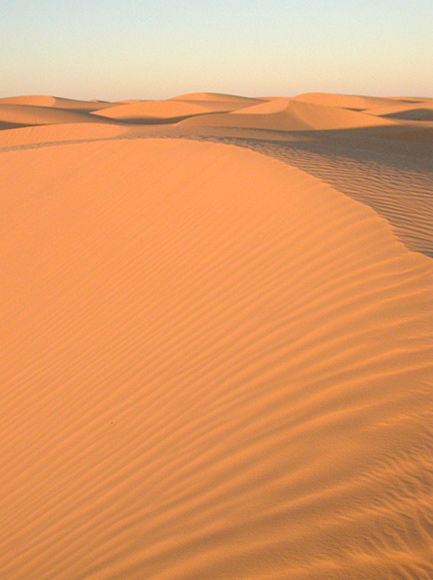
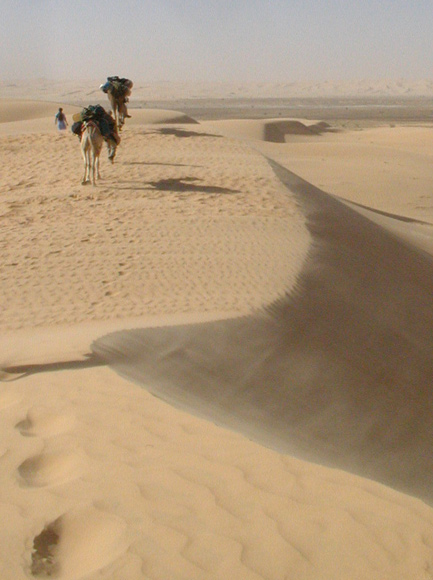 |
Still as frozen in time, or swirling all around like the whole world's a snowdome, the desert can present so many different faces.
Posted by yingzhao 09:08 PM | Permalink
February 01, 2005 |
The Things They Carried
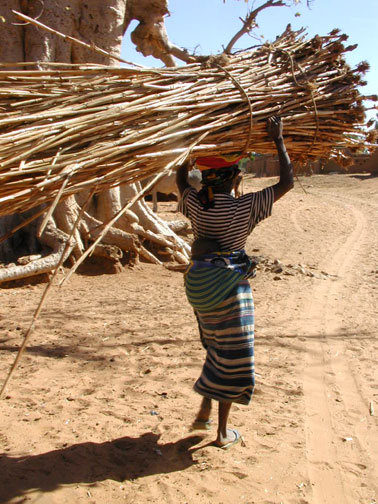
At the tiny port in Gao, Mali, where the Niger river comes right up to the back of the market stalls, the bigger boats are still some ways off. Men in long boubous load onto their heads huge grain bags as tall as and thicker than a man, and slowly walk into the water, waist deep, loading them onto the boats. Boys trudge into the same river downstream in Mopti, for the boats ferrying sand to the city. Stretching out a piece of fabric holding two corners each, two boys per team carry the sand to shore in countless trips. On the shore the sand is sifted shovel by shovel, made into bricks dried by the sub-Saharan sun. In Djenné, where the streets are narrow and overflowing with mud, these bricks are then carried two per head to where they need to go. Whenever I travel to a developing country, I'm awed by the volumes of the world moved by head, limb, and torso. The women of Africa, of course, are famous the world over for what they can carry and how they carry it off, physical definitions of grace under pressure. Bundles of sticks for stoking a fire, halves of calabash, or tubs of enamel with towering piles of produce or laundry barely moves, while she climbs up steep escarpments with not a glance downward, pulls up one side of her billowy boubou to cover a glistening shoulder, and chats with her sisters. There's almost always a babe at the small of her back, two little feet sticking to each side of her waist, content to be swayed everywhere.
In the developed world such physicality, a kinetic sympathy of the weight of the world, is removed from daily life. Container ships, cranes, semis, cars, forklifts, and astronomical volumes are moved on paper and through fiber-optic cables (containers frequently slide off into the sea and it means nothing, I'm told). I suspect that in the world as a whole, flesh and bone move amounts many, many times over than that of steel and conveyer belts. Compared to the weight a grown man or woman often bears in Africa, or the percentage of his weight a child carries, my 30-kilo backpack is really nothing. Yet everything carried this way halfway around the world involves great calculation and weighing in my head. Especially the "non-essential" things: a few silk handkerchiefs and bracelets, tokens of appreciation for women I encounter and won't share a language with; one book, for which I chose Barbara Kingsolver's Poisonwood Bible, as thick as its namesake and an astonishing treatise on the surface and depth of daily life in an African jungle; one picture: that of me on my graduation day from University of California with Peter, who taught me ECON 1A and 1B, Principles of Macro and Microeconomics at the community college a few years earlier. Peter taught that economics is about human motivations, taught me to see past the language of charts and graphs of our mind-bogglingly complex systems to the human stories and urges underneath. Thus an idealist like me can live in this world, remaining in touch.
If people often seem happier in the developing world, it's perhaps because they understand better what they value, and the value of the things around them. When everything must be carried on heads and backs, one is more certain of its use, how it fits in to the greater scheme of things. That includes rice and couscous, hand-fashioned tools, as well as second-hand tape players, brightly colored plastic buckets. Their use is as evident as their weight, in an environment where nothing is superfluous.
Traveling affirms this: in slow journeys, a westerner can temporarily move past the expectations of efficiency, utility, and return on investment, beyond the classifications of capitalism or socialism; Christian, Muslim, or animist; local, indigenous, or foreigner; and see the sunlight and sand and the well and buckets, the men, women, and children doing work and living life: the environment and the human beings forever making peace with it. Poverty underlines this connection as development means complexity means abstraction, while in much of the world it's shoulders to field, hand to mouth, literally. Poverty is not to be romanticized, not pitied nor worshipped; it's just reality, and we look to understand it, to work within it. No matter how we value our educated thought processes, we can only hold so many levels of abstraction in our head without losing them, forgetting the original connections. Thus it's always the details that communicate and serve for memory, not the speech of politicians, economists, business and religious powers-that-be with the lofty and abstract ideals. In America we collectively suffer from a distance from the real, amnesia of the past real, protection from the future real, no burdens to bear leading to an unbearable lightness. We need doses of reality, of nature's poverty and richness, of work done that brings a very tangible reward, of one person's place in a community and in the environment... a sustenance as important as food.
The weight of a thing makes it real. The distance it was carried connects it to everything else. The weight of what I carry also makes me real, and connects me to everything else. In Mopti a young girl, couldn't have been more than 13, took a liking to me and when I shook her hand I was surprised that it felt like a grown man's, thick and callused. By the riverbank of Mopti, I buy tiny bags of peanuts from an old woman and her granddaughter each day, just to exchange smiles with them. The grandma would lay out all the change coins on her palm, so that I could count the unfamiliar currency. I always marveled at her gentleness and her fragile, age-spotted hand as I remove the coins one by one, leaving a few as a kind gesture. I should have left more for her each time. When I touch someone's hand, I become aware of the weight she's accustomed to carry. I do not hold each hand lightly, for I will be carrying the weight of their existence with me too.
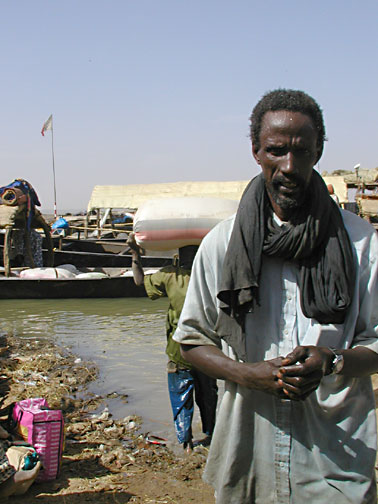
Posted by yingzhao 11:54 PM | Permalink
May 12, 2004 |
Age
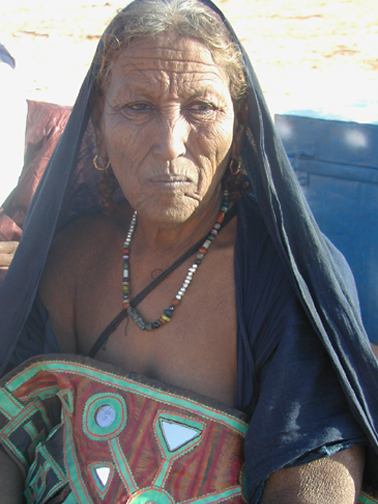
» Click here to see more images from Northern Mali, January 2004. «
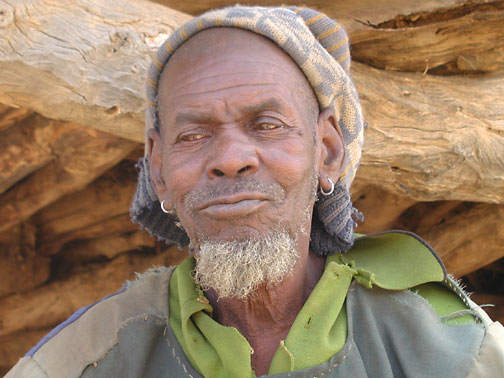
» Click here to see more images from Southern Mali, December 2003. «
Posted by yingzhao 11:16 AM | Permalink
March 09, 2004 |
Tamashek Festival at Essouk
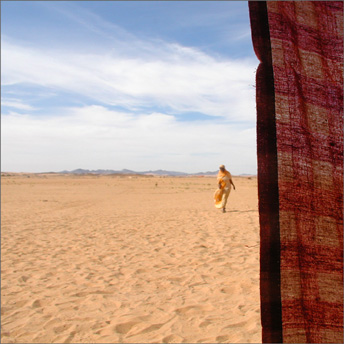
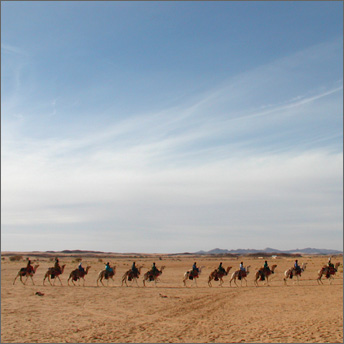
» Click here for more of the nomadic peoples of Northern Mali. «
Posted by yingzhao 09:17 PM | Permalink
March 07, 2004 |
Blue men of the Sahara
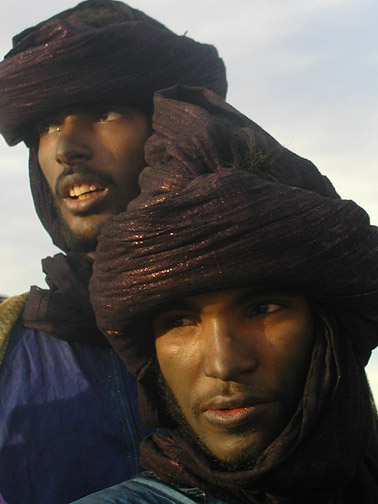
The Tamashek (Tuareg) men at Essouk, Mali. They'll called the blue men because excess pigment from their richly brilliant indigo turbans rubs off onto their skin.
Otherwise I still don't know what to say about west Africa. I may speak only in pictures for a while, or nothing at all.
Posted by yingzhao 11:30 PM | Permalink
February 22, 2004 |
Back from Africa
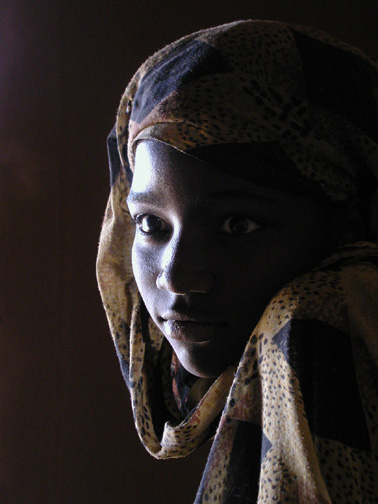
Back from Africa. This is my favorite image from the trip, shot in the Ouadane oasis, Mauritania.
» Click here to see more images from Mauritania, January and Feburary 2004. «
Posted by yingzhao 03:35 PM | Permalink
February 15, 2004 |
Out of Africa
At what point does one stop counting the days after something significant: the morning after the disaster, two days after that incident, third day after I'm back from traveling? At some invisible dateline, one must stop counting, one can't help but stop counting, for one cannot keep her back to the future. Increasingly the sexual analogy seems fitting for the trip, even though it began tongue-in-cheek. A sense of "what happened exactly?" hangs over me, I walk hesitatingly, restoring my equilibrium. Do not take the analogy literally, it's an example of something powerful, something violent, something that changes, for a while, the way that you peer from behind your eyeholes. I go through the motions of travel aftermath, letting friends know I'm back in town, getting myself set up to take on projects, washing everything I took with me. And EVERYTHING I took needs washing. I watch the yellow Sahara sand and red Sahel dirt swirl against the white washbasins, with the same ambiguous feeling one washes stained sheets.
To wish to go back right now would be no more than masochism--that suffering makes experiences more life-like, more sexual. I would not be so simple. The reasons for such an attraction? Perhaps it was the earth's barren skin; or the incredible living one scrapes on it, any living thing; or the outstretched, soliticious hands; or perhaps it was just the difference, to be immersed and embraced--I desired it with desperation, yet at times, it was more than anyone can take.
But with time, anything so overwhelming, choking your throat, is swallowed and digested and integrated throughout. Very soon I will stop counting.
Posted by yingzhao 01:35 AM | Permalink
January 19, 2004 |
Happy Chinese New Year's from Africa
More than 3 weeks off internet, and what a pleasure to see all the holiday greetings. In the heat and dust and difficulty of traveling in sub-Saharan Africa, it's good to feel one's friends near and far.
I've walked many evenings in the Sahara, the moonlight so like liquid that I liked to imagine walking on the sand at the bottom of a giant aquarium, and if I jumped up a little, the water would lift me into the night sky. Just this has been worth it. Much more to say, but the dial-up connection is not so conducive! Until soon...
Posted by yingzhao 10:46 AM | Permalink